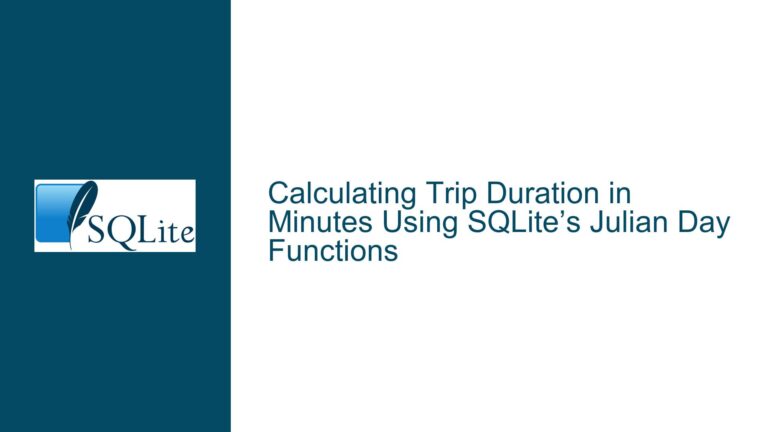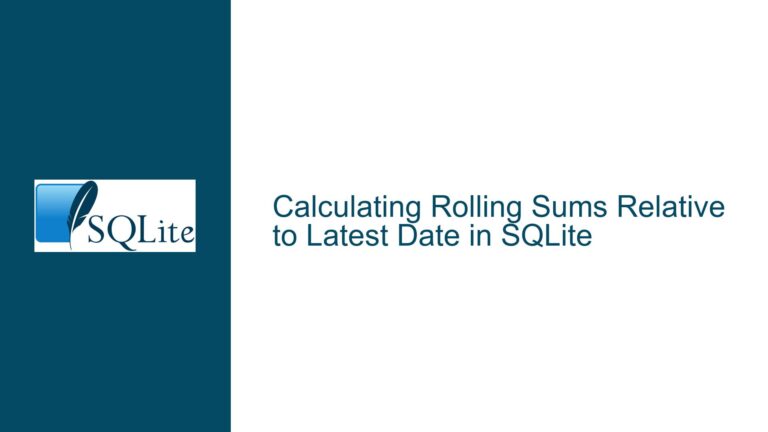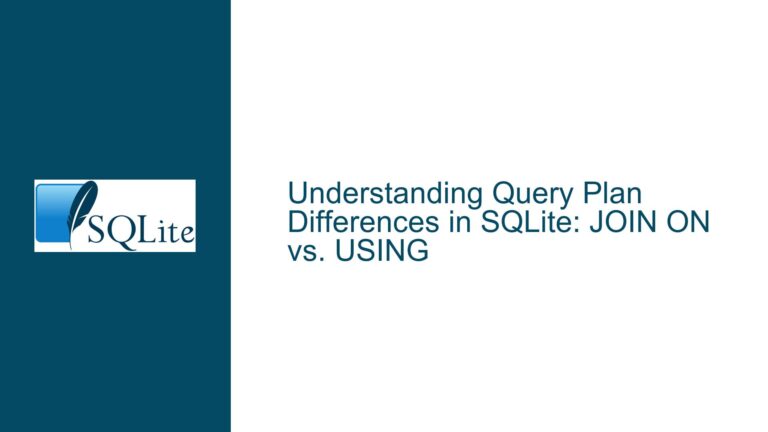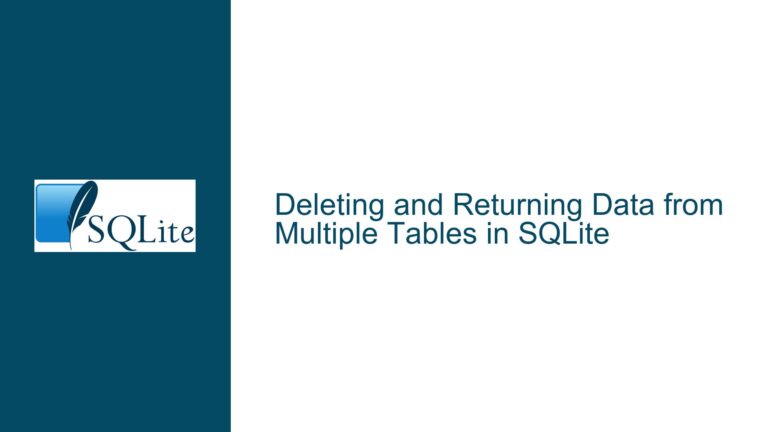PRAGMA Functions vs Statements in Transactions: Syntax and Scope Issues
Understanding PRAGMA Behavior in Transactions: Syntax Ambiguity and Isolation Levels
1. PRAGMA Statements vs. Table-Valued Functions: Key Differences in Transaction Contexts
The core issue revolves around the behavioral differences between traditional PRAGMA statements and their table-valued function equivalents when executed within SQLite transactions. Specifically, PRAGMA statements (e.g., PRAGMA table_info(t)) appear to observe uncommitted schema changes made within a transaction, while their function counterparts (e.g., SELECT * FROM pragma_table_info('t')) may fail to recognize these changes or produce unexpected errors. This discrepancy stems from three interrelated factors:
A. Syntax Ambiguity in Argument Handling
PRAGMA statements implicitly treat unquoted identifiers as string literals. For example, PRAGMA table_info(t) is parsed as PRAGMA table_info('t'), where t is interpreted as the table name. In contrast, table-valued PRAGMA functions follow standard SQL identifier resolution rules. When using pragma_table_info(t) without quotes, SQLite interprets t as a column reference or variable, not a string literal. This leads to errors like no such column: t if the identifier is not properly quoted or bound.
B. Transaction Isolation and Schema Visibility
PRAGMA statements operate within the transactional context where they are executed. When a table is created or modified in an uncommitted transaction, PRAGMA statements reflect these changes immediately. However, PRAGMA functions rely on SQLite’s internal schema cache, which may not update until the transaction is committed. This creates an inconsistency: PRAGMA functions may query the last committed schema state, ignoring uncommitted changes, while PRAGMA statements interact with the pending schema modifications.
C. Experimental Status of PRAGMA Functions
The documentation explicitly labels PRAGMA functions as experimental. This implies their behavior may diverge from PRAGMA statements in edge cases, such as transaction rollbacks, nested savepoints, or schema modifications. The lack of explicit guarantees about isolation levels or argument parsing rules contributes to unexpected failures when developers assume parity between the two forms.
2. Root Causes of PRAGMA Function Failures in Transactions
A. Identifier Resolution in SQL Expressions
Table-valued PRAGMA functions are invoked within SQL SELECT statements, where identifiers like t are resolved as column names unless explicitly quoted or cast as literals. For example:
-- Incorrect: SQLite looks for a column named 't'
SELECT * FROM pragma_table_info(t);
-- Correct: 't' is treated as a string literal
SELECT * FROM pragma_table_info('t');
This mismatch between PRAGMA statement behavior (auto-quoting) and SQL function syntax (strict identifier resolution) is a common source of errors.
B. Schema Cache Invalidation Timing
SQLite maintains a schema cache to optimize query planning. PRAGMA statements force an immediate refresh of this cache when schema changes occur, even in uncommitted transactions. PRAGMA functions, however, may read from a stale cache if the transaction has not been committed. This explains why PRAGMA table_info(t) succeeds after CREATE TABLE t(x) in a transaction, while pragma_table_info('t') might fail if the cache hasn’t been invalidated.
C. Parameter Binding vs. String Interpolation
When integrating PRAGMA functions into application code (e.g., Tcl, Python), improper parameter binding can exacerbate visibility issues. For instance, using string interpolation without proper quoting:
# Risky: tbl might not be quoted correctly
db eval "SELECT * FROM pragma_table_info($tbl)"
This can lead to SQL injection or parsing errors. Safe practices involve using bound parameters or framework-specific escaping mechanisms.
3. Resolving PRAGMA Function Errors and Ensuring Transactional Consistency
A. Correct Syntax for PRAGMA Functions
Always pass table and schema names as string literals or bound parameters:
-- Explicit schema and quoted table name
SELECT * FROM pragma_table_info('t', 'main');
For dynamic table names in application code, use parameter binding:
# Tcl example with safe parameter substitution
db eval {SELECT * FROM pragma_table_info(:tbl)}
B. Forcing Schema Cache Updates
To ensure PRAGMA functions observe uncommitted schema changes, manually invalidate the cache using PRAGMA schema_version:
BEGIN;
CREATE TABLE t(x);
PRAGMA schema_version = schema_version + 0; -- Force cache refresh
SELECT * FROM pragma_table_info('t');
ROLLBACK;
This workaround tricks SQLite into reloading the schema, though it is undocumented and may not work in future versions.
C. Migrating from PRAGMA Statements to Functions
When replacing PRAGMA statements with their function equivalents, audit all argument handling:
- Replace implicit identifier quoting with explicit string literals.
- Use
SELECT * FROM pragma_...instead of standalone PRAGMA syntax. - Validate results in transaction rollback scenarios to detect cache staleness.
D. Leveraging SQLite’s Pragma Compatibility Matrix
Understand which PRAGMAs have stable function equivalents. For example, pragma_table_info is reliable for basic metadata, while pragma_foreign_key_list may exhibit inconsistencies. Test critical functions under rollback and nested transaction conditions.
E. Transactional Best Practices
Avoid mixing PRAGMA statements and functions for schema introspection within the same transaction. If uncommitted schema changes must be queried, prefer PRAGMA statements for accuracy. Reserve PRAGMA functions for committed schema states or read-only transactions.
F. Debugging Techniques
Use EXPLAIN to analyze how PRAGMA functions resolve identifiers:
EXPLAIN SELECT * FROM pragma_table_info(t);
-- Look for "Column t" in the opcode list, indicating incorrect resolution
This reveals whether the argument is misparsed as a column instead of a literal.
By addressing syntax ambiguities, understanding schema cache behavior, and adopting transactional best practices, developers can mitigate errors when using PRAGMA functions. The experimental nature of these functions necessitates rigorous testing, especially in applications relying on complex transaction flows or dynamic schema modifications.






